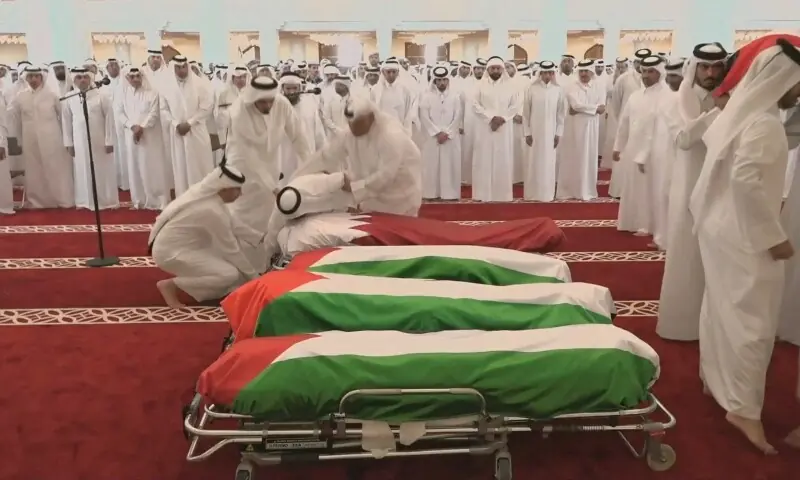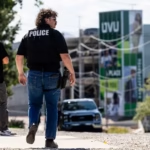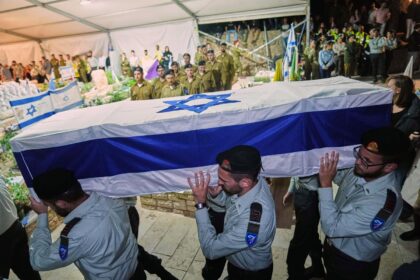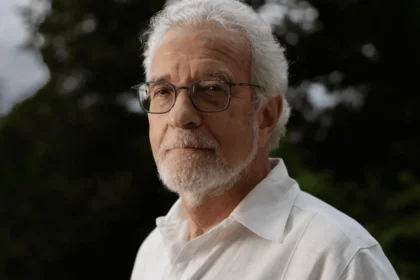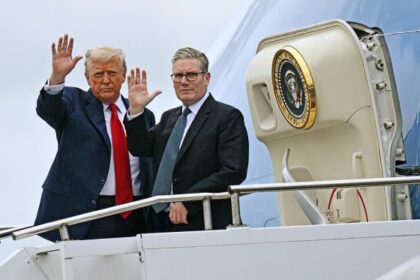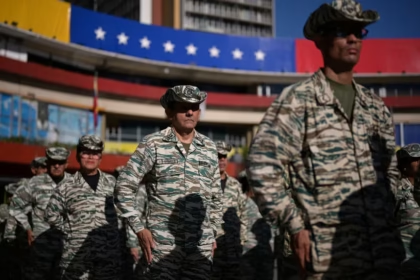Doha, Qatar — Hamas on Thursday accused the United States of being a “full accomplice” in Israel’s deadly airstrike on its delegation in Qatar, which killed six people and brought already faltering Gaza ceasefire talks to a halt. The strike — an unprecedented Israeli attack on a Gulf state — has sent political shockwaves across the region and prompted calls for a reassessment of Qatar’s mediation role.
Hamas official Fawzi Barhoum said the airstrike amounted to a deliberate attempt to sabotage negotiations and undermine the roles of Qatar and Egypt, long considered key intermediaries in Gaza peace efforts.
“This crime was not only an assassination of individuals — it was an assassination of the entire negotiation process,” Barhoum said in a televised statement.
High-Level Funeral in Doha
In a solemn funeral in Doha on Thursday, Qatar’s emir, Sheikh Tamim bin Hamad Al Thani, joined hundreds of mourners at the Sheikh Mohammed bin Abdul Wahhab Mosque. Six coffins were brought into the mosque, one draped with a Qatari flag and five with Palestinian flags. Among the dead were five Hamas members and a Qatari soldier.
According to Qatar’s interior ministry, Lance Corporal Badr Saad Mohammed al-Humaidi al-Dosari was killed in the blast, along with several aides to Hamas chief negotiator Khalil al-Hayya. Those killed included Hamam al-Hayya (Khalil’s son), Jihad Labad, and three bodyguards. Hamas said members of Khalil al-Hayya’s family — including his wife, daughter-in-law, and grandchildren — were injured in the attack on a residential compound.
Hamas has stated that al-Hayya survived, although his whereabouts remain unconfirmed. He did not appear in funeral footage, and Qatari Prime Minister Sheikh Mohammed bin Abdulrahman Al Thani said Wednesday he could not confirm his condition.
U.S. and Israeli Positions
While Israel said the target was Hamas leadership, Hamas has described the strike as a political message aimed at derailing peace efforts. The Israeli government has not publicly confirmed it carried out the strike, but multiple sources attribute the operation to Israeli forces.
Hamas directly implicated the U.S. in the incident, alleging coordination or tacit approval.
“The U.S. administration is a full accomplice in this crime,” said Barhoum.
The White House denied prior knowledge of the strike. Former President Donald Trump, speaking through aides, said he was not informed in advance and had directed envoy Steve Witkoff to contact Qatari officials immediately after learning of the operation. But, according to the account, the strike was already underway.
Qatar Reconsiders Mediator Role
Speaking to CNN, Qatar’s prime minister said the Israeli strike had “killed any remaining hope” for a hostage deal and that Qatar was re-evaluating its role as mediator. He said the country is now considering “everything” — a statement signaling that the emirate may scale back or suspend its involvement in future indirect negotiations.
Qatar has hosted several rounds of indirect talks between Hamas and Israel, and since 2012, has allowed Hamas to operate a political office in Doha with U.S. consent. Now, that role is in jeopardy.
Sheikh Mohammed added that he hopes for a collective regional response and is seeking to convene an Arab-Islamic summit in Doha to determine a way forward.
Regional and International Reactions
The attack drew swift condemnation across the Gulf and broader international community.
The United Arab Emirates issued a rare rebuke of Israel, stating that “any aggression against a Gulf Cooperation Council member state constitutes an attack on the collective Gulf security framework.”
The United Nations Security Council condemned the strikes in a carefully worded statement that did not name Israel but affirmed support for Qatar’s sovereignty and territorial integrity. The statement — backed by all 15 council members, including the U.S. — emphasized the urgency of de-escalation and called for renewed focus on the release of hostages and ending the war in Gaza.
“Council members underscored that releasing the hostages, including those killed by Hamas, and ending the war and suffering in Gaza must remain our top priority,” the statement read.
A Pattern of Regional Escalation
The strike on Doha follows a July 2024 assassination of former Hamas leader Ismail Haniyeh in Tehran, an attack also widely attributed to Israel. His funeral was held in Qatar earlier this year.
The strike on Qatari soil marks a significant escalation in the conflict, potentially reshaping diplomatic dynamics in the region, where Gulf states have largely remained insulated from direct military action.
As the region reels from the incident, the Gaza truce process appears frozen, and regional mediators face mounting pressure to respond decisively — or withdraw entirely.


